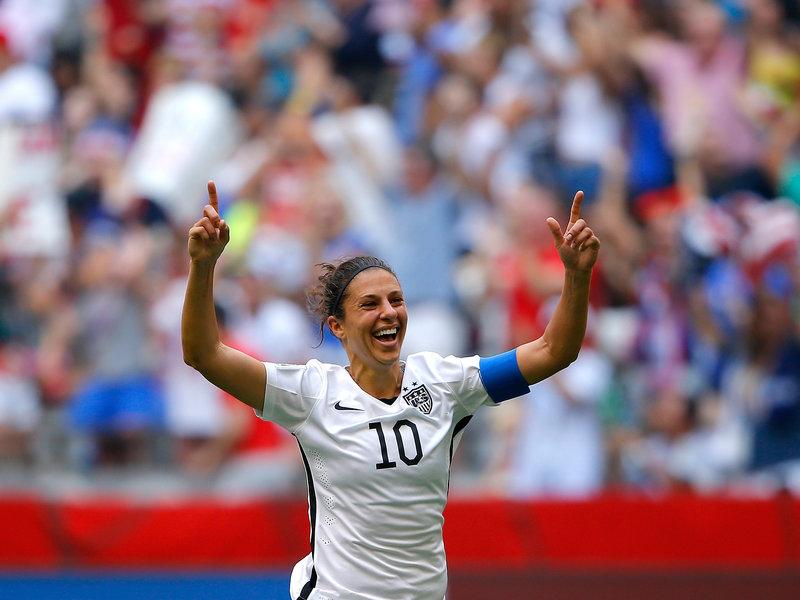
How much fun is sports twitter? I was newly reminded last night during the breathtaking opening minutes of the USA vs. Japan World Cup, when my TL was a sea of caps lock and gif dexterity reacting to the USA team’s performance and Carli Lloyd’s unprecedented hat trick. “I love Twitter,” my male partner laughed as we watched the game together over beers.
Then I retweeted a statistic about how the US women soccer players will make four times less to win the World Cup than their male counterparts make to reach the Round of 16. And my notifications saw a bit of a jump.
“You need to understand capitalism,” one lurker concluded at the end of a four-tweet streak in my mentions.
“Until women shell out money for women’s sports they will lag behind, sorry,” said another (I’m paraphrasing that one; I blocked him before I thought to grab a screenshot after realizing that life is short and my beer was getting flat).
The source of the outrage was clear: I’d drawn attention to a massive inequality, and this one—unlike the wage gap in the corporate world—creates enough public confusion and apathy to have become a fecund pool of Men’s Rights euphoria. When it comes to equal pay in general, men’s rights activists and other anti-feminist trolls must resort to denialism, but they have a more hospitable environment when the topic is sports and they can shrug and drop their trump card: Women’s sports just don’t make as much money.
Feminists can immediately recognize this as the “Lean In” fallacy. Putting the pressure on a marginalized group to correct inequality ignores massive systems of oppression and takes responsibility from those who deserve it: the privileged groups who created these systems. But we need to do a better job of helping the general public understand what to say when women’s sports are dismissed as simply less entertaining.
As Maggie Mertens wrote in an excellent piece for The Atlantic, “The gender inequities in sports are just as vast as those faced by women in corporate offices and on movie sets, but for some reason they fail to incite the same level of outrage.” Mertens cites four points by Hollis Elkins, writing about the divide between women’s movement and sports in 1978, to explain why:
One: Female athletes were perceived as either unconcerned with or hostile toward the women’s movement. Two: Feminists didn’t want to be “doubly damned” by “the suspicion of lesbianism” that both feminists and female athletes faced. Three: Sports was seen as a realm where men proved their manliness, negatively predisposing many feminists toward sports in general. And four: Sports was considered “frivolous.” It wasn’t seen as being as important as issues like the right to work, abortion, and equal pay.
Modern-day feminists should find these observations damning.
We have no reason to expect today’s athletes to be hostile to the cause of feminism. Top fighters like Fallon Fox and Ronda Rousey are championing equality outright. And how many young girls’ hearts soared after watching Carli Lloyd’s midfield goal just a quarter of an hour into last night’s game? I remember seeing Mia Hamm and Lisa Leslie in American Girl magazine as a kid and being awed by their strength and talent; later, I idolized the Williams sisters (who continue to be goddesses fifteen years into their career).
The homophobic aspect of the feminist aversion to sports activism is an embarrassment. At this point I think most feminists have been met with assumptions about their sexuality and gender identity that reflect the heteronormativity and oppositional sexism permeating our society: You criticize sexism. Do you hate men? Are you a lesbian? Because that would undermine your argument. Because there’s something wrong with lesbians because they don’t have sex with men.
It’s ridiculous and it’s been covered at length, and this unfortunate history of throwing queer women under the bus is a reason to double down on our efforts as modern feminists to embrace all female athletes.
That sport is a haven of toxic masculinity is an important point—and one that cannot be solved by feminists shying away from sports culture. Author and journalist Dave Zirin’s writing combines a fierce interest in social justice with a love of sport, and the result is anything but diluted. Just as patriarchy hurts men, sport needs feminism—for female athletes, but also for social justice more generally.
And considering the prevalence of disordered eating and exercise obsession among young and nonprofessional athletes, the fitness world in general can benefit from feminism as much as feminists can benefit from positive fitness models.
And are sports frivolous? Perhaps, but no more so than entertainment—and feminists have no trouble wearing out their keyboards on Game of Thrones and Nicki Minaj. Entertainment is a microcosm of cultural values and change that can play out on the field just as it can on screen, and it has. Sport has been the locus for the fight for racial equality and, more recently, LGBTQ equality, and feminism must link arms with these struggles and lift up the athletes brave enough to change the system from within. We can fight rape culture in football without erasing or dismissing the female athletes who are constantly discouraged from continuing in their passion.
Sport is strength and willpower and discipline and drive. Sport fosters diversity. Sport teaches companionship in a world where women are taught to compete against each other solely for men. As feminists we need the sports world and we need to support our athletes.
In an unfortunate sense, that one twitter guy was right: women do need to step up and support women’s sports. With our dollars, yes, but more importantly, by demanding and generating coverage of their games and their rising stars and their battles for justice. These athletes need media attention to generate interest, and they need money and viewer incentive to fund production values in their coverage. To achieve this, we have to embrace their cause without reservation.
It should outrage us that female soccer players play on an inferior field and that the media barely covered their lawsuit simply for real grass. And we should have something to say when the dominant cultural narrative shrugs and says, “Women’s sports just don’t bring in as much revenue,” just as we do when it says women aren’t funny and women are too emotional to lead and women can’t be scientists. We need to see it as the vicious cycle we’ve been fighting all along. Give us the same resources and, literally and figuratively, an equal playing field—and then let us show you what we’ve got.
Featured image: Kevin C. Cox/Getty Images





I find it interesting that you write a entire article about women getting paid for sports, yet not one single mention of the WNBA. The focus of the USWNT is due to the fact the marketable stars are White & Middle Class.
I was reacting to the big World Cup final last night and the comments I encountered afterward; hence the introduction and image. However, at no point did I restrict my arguments about feminism in sports to soccer, and I mentioned athletes in UFC, WNBA (Lisa Leslie?), and tennis as inspirations in this post, so I’m not sure how you got the impression that I think athletes should receive equal pay in soccer but not basketball.
It’s a minor point, but it’s interesting that your lurker assumed that women (and not men) should be the ones funding women’s sports. Yes, women should, but so should men. Men’s sports don’t rely 100% on male attention and funding, so why should female athletes have to depend only on female fans? (Looking at the crowds watching the USA, there were male faces among them.)
Yes, exactly. It’s the bootstrap argument: “If you could just GET ON OUR LEVEL sexism would be over!” The idea that male athletes get their income solely from revenue from male sports fans and customers is clearly wrong, but women are told we should bear the sole burden for closing the gap.
Male allies can help here by using their privilege (including their higher wage and often more disposable income) to support women’s sports with their eyeballs and dollars, and challenge this line of thinking when they hear it.
This is more of an aside, but I thought about it when you brought up those working the capitalistic angle: I get particularly frustrated with those who will say women’s sports aren’t exciting. That’s bunk on a few different levels. One level is where such people also imply that women aren’t nearly as good of athletes as men. But the other is that they ignore the other factors that make sports exciting. It would seem to me that a significant factor is the social aspect — we like watching sports with other people. This becomes a bit of a self-fulfilling prophecy: since one does not find the games exciting, they don’t go/watch, which then makes the experience less exciting for those who do.
FIFA is so abominably corrupt that it is difficult to know where to start.
The money won by the winning women’s team is also less that a fifth of one of the bribes taken by just one of the FIFA board member. The building of the stadiums for the Qatar competition has notched up over 1000 deaths so far.
The European confederation came very close to breaking away from FIFA a few months ago and likely would have done had Blatter not resigned.
‘Capitalism?’ Really? What happens to someone’s mind, to make that the answer to every question?
And professional sports are far more like feudal fiefdoms than any sort of owned corporation where the mechanisms of capitalism are actually involved. Are FIFA corruption and slavery in Qatar to be shrugged off by invoking ‘capitalism?’
One issue here is that in sports, unlike the cases of stand-up comedy and/or science, men and women are segregated and do not compete for the same positions. Men and women could just as easily have been playing indifferent sports, say hockey and curling, instead of football. And I believe there would be no outcry over that hockey-players get more for participation in the Olympics than their counterparts i the curling teams.
Nevertheless, I believe that more “successful” sports should help the other, usually this is a win-win situation.
It seems to me (I don’t follow any sport closely) that one of the few sports where women get as much attention and money as the men is tennis. It was a fight to get to this point. One argument was that because women’s matches were 2-3 sets long and men’s were 3-5 sets long, the women didn’t work as hard or provide as much advertising opportunities and so shouldn’t be paid as much. This argument does have some merit in my opinion. However, why should women’s matches be shorter than men’s? Why not have some tournaments that are best-of-two matches (for both men and women) and other tournaments that are best-of-three? It would be just another dimension like ‘clay or grass’. While men and women biologically differ in upper body strength, I don’t believe they do so in stamina (and even if they do it the contests would still be equal.)